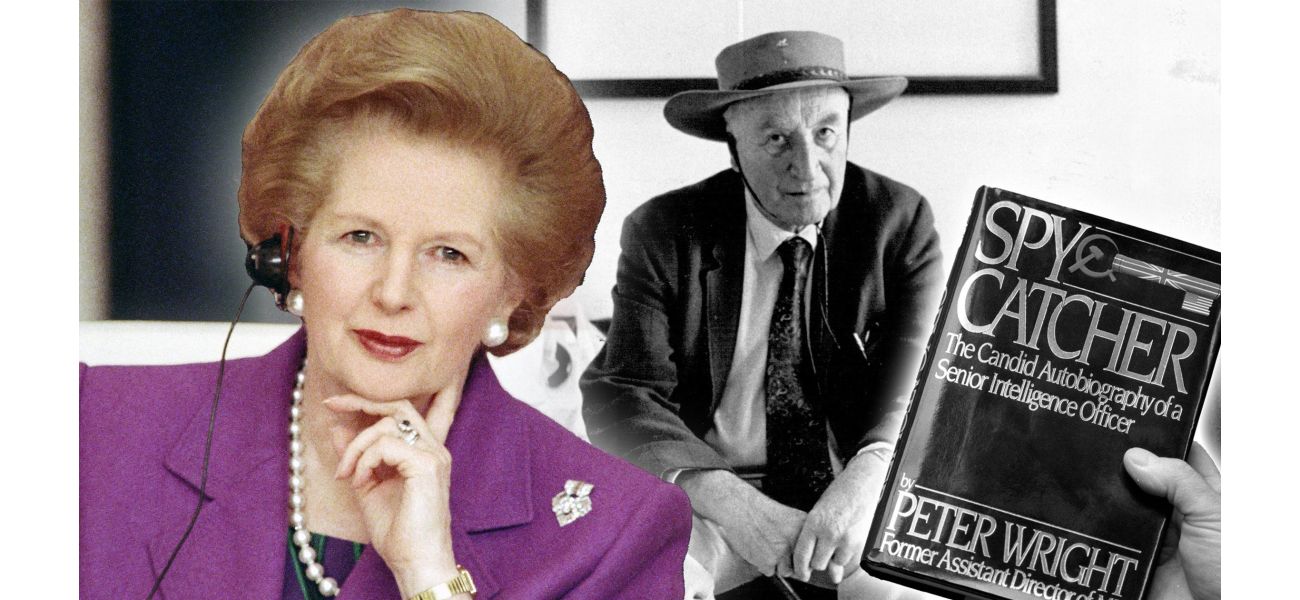Spy writes book, government tries to stop it.
Spycatcher caused quite a stir.
October 13th 2024.

The book Spycatcher caused quite a stir when it was released, with its claims of state secrets and shady dealings within MI5. As a retired British counter-intelligence agent, Peter Wright's memoir detailing his role in exposing a Soviet mole in the agency seemed like a sure-fire hit. And it was, at least in the United States. However, the British government took legal action to ban the book from being sold in the UK, and even blocked newspapers from covering its contents. Margaret Thatcher, the prime minister at the time, was particularly determined to prevent the public from reading it. In fact, she expressed her shock and concern in a briefing note, which was later declassified and revealed to the public.
Despite the government's efforts, they were ultimately unable to stop the publication of Spycatcher. In 1987, after a major legal battle, the book was finally able to be read by millions of Britons. It was no secret that Margaret Thatcher had read the unpublished manuscript in 1986, and it's safe to say that the controversial book caused quite a stir. Wright had served in MI5 for over 20 years before retiring and moving to Australia. His memoirs made bold accusations against MI5 officials, including plotting against fellow spies, defaming former prime minister Harold Wilson, and even alleging that top agents were communists. While these claims were largely discredited by the government, they still fueled speculation and criticism about MI5's activities. After all, the government had long denied the existence of MI5, despite its founding in 1909.
The British government was determined to prevent Spycatcher from becoming a summer holiday read for the public. They succeeded in blocking its publication in the UK in 1985, and newspapers were even issued gag orders to prevent them from discussing the book. Libraries were also warned that stocking Spycatcher could lead to legal consequences. Wartime powers were even used to try and stop people from smuggling the book into the UK. Despite these efforts, however, the book was easily obtainable in the United States thanks to the First Amendment right to free speech. By late 1987, it had sold 400,000 copies.
But the government's troubles didn't end there. They took Wright to court in an attempt to prevent the book from being sold in Australia, but their efforts were struck down by the court. Downing Street then appealed to Australia's highest court, but the book was still able to be sold in Scotland where newspapers were allowed to cover the UK's legal proceedings in Australia. This caused concern for the government, as they worried about how it looked to outsiders. The House of Commons Speaker faced pressure to ban MPs from discussing Spycatcher, but ultimately, the government lost its fight to prevent the book from being sold in Australia in 1987.
The Law Lords, who served as the judicial branch of the House of Lords, initially seemed to rule in favor of the government in their case against the press. They found that Wright's book was a serious breach of confidentiality, as it revealed sensitive information about the inner workings of MI5. However, they also ruled that the government's use of gag orders against the Observer and the Guardian violated freedom of speech. The press was allowed to publish extracts from Spycatcher, and the damage to MI5's reputation had already been done since the book was freely available abroad. Wright himself passed away in 1995, but not before becoming a millionaire thanks to the international sales of Spycatcher.
Despite the controversy surrounding Spycatcher, its editor Donald Trelford saw the ruling as a victory for democracy, as it allowed the public to know about important matters. In fact, a secret note sent to Tory MPs just a month after the ruling stated that the introduction of the Security Service Act, which acknowledged the existence of MI5 for the first time, was meant to increase public confidence and support in the agency. However, part of the ruling also prohibited Wright from making any royalties from the book's sales in the UK. Nevertheless, he died a millionaire at the age of 78. In his obituary, The Independent newspaper wrote that no other British intelligence officer, aside from Kim Philby, had caused as much chaos within the secret service and trouble for politicians as Peter Wright.
Despite the government's efforts, they were ultimately unable to stop the publication of Spycatcher. In 1987, after a major legal battle, the book was finally able to be read by millions of Britons. It was no secret that Margaret Thatcher had read the unpublished manuscript in 1986, and it's safe to say that the controversial book caused quite a stir. Wright had served in MI5 for over 20 years before retiring and moving to Australia. His memoirs made bold accusations against MI5 officials, including plotting against fellow spies, defaming former prime minister Harold Wilson, and even alleging that top agents were communists. While these claims were largely discredited by the government, they still fueled speculation and criticism about MI5's activities. After all, the government had long denied the existence of MI5, despite its founding in 1909.
The British government was determined to prevent Spycatcher from becoming a summer holiday read for the public. They succeeded in blocking its publication in the UK in 1985, and newspapers were even issued gag orders to prevent them from discussing the book. Libraries were also warned that stocking Spycatcher could lead to legal consequences. Wartime powers were even used to try and stop people from smuggling the book into the UK. Despite these efforts, however, the book was easily obtainable in the United States thanks to the First Amendment right to free speech. By late 1987, it had sold 400,000 copies.
But the government's troubles didn't end there. They took Wright to court in an attempt to prevent the book from being sold in Australia, but their efforts were struck down by the court. Downing Street then appealed to Australia's highest court, but the book was still able to be sold in Scotland where newspapers were allowed to cover the UK's legal proceedings in Australia. This caused concern for the government, as they worried about how it looked to outsiders. The House of Commons Speaker faced pressure to ban MPs from discussing Spycatcher, but ultimately, the government lost its fight to prevent the book from being sold in Australia in 1987.
The Law Lords, who served as the judicial branch of the House of Lords, initially seemed to rule in favor of the government in their case against the press. They found that Wright's book was a serious breach of confidentiality, as it revealed sensitive information about the inner workings of MI5. However, they also ruled that the government's use of gag orders against the Observer and the Guardian violated freedom of speech. The press was allowed to publish extracts from Spycatcher, and the damage to MI5's reputation had already been done since the book was freely available abroad. Wright himself passed away in 1995, but not before becoming a millionaire thanks to the international sales of Spycatcher.
Despite the controversy surrounding Spycatcher, its editor Donald Trelford saw the ruling as a victory for democracy, as it allowed the public to know about important matters. In fact, a secret note sent to Tory MPs just a month after the ruling stated that the introduction of the Security Service Act, which acknowledged the existence of MI5 for the first time, was meant to increase public confidence and support in the agency. However, part of the ruling also prohibited Wright from making any royalties from the book's sales in the UK. Nevertheless, he died a millionaire at the age of 78. In his obituary, The Independent newspaper wrote that no other British intelligence officer, aside from Kim Philby, had caused as much chaos within the secret service and trouble for politicians as Peter Wright.
[This article has been trending online recently and has been generated with AI. Your feed is customized.]
[Generative AI is experimental.]
0
0
Submit Comment





